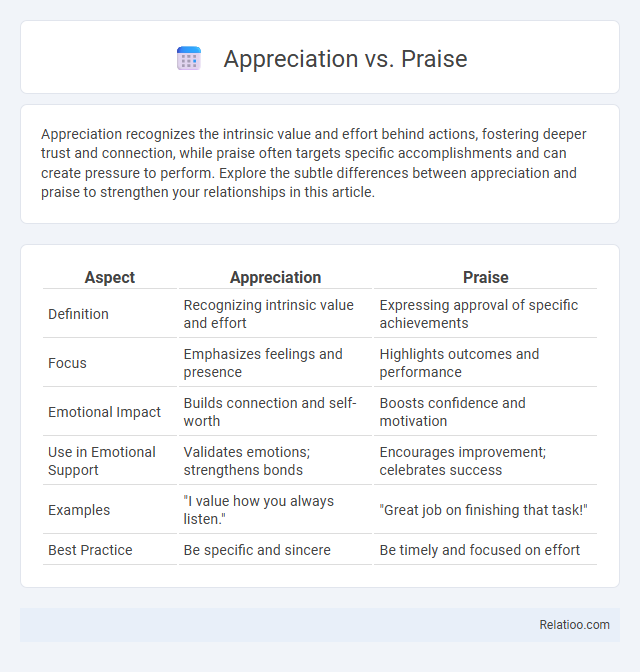Appreciation recognizes the intrinsic value and effort behind actions, fostering deeper trust and connection, while praise often targets specific accomplishments and can create pressure to perform. Explore the subtle differences between appreciation and praise to strengthen your relationships in this article.
Table of Comparison
| Aspect | Appreciation | Praise |
|---|---|---|
| Definition | Recognizing intrinsic value and effort | Expressing approval of specific achievements |
| Focus | Emphasizes feelings and presence | Highlights outcomes and performance |
| Emotional Impact | Builds connection and self-worth | Boosts confidence and motivation |
| Use in Emotional Support | Validates emotions; strengthens bonds | Encourages improvement; celebrates success |
| Examples | "I value how you always listen." | "Great job on finishing that task!" |
| Best Practice | Be specific and sincere | Be timely and focused on effort |
Understanding Appreciation and Praise
Understanding the difference between appreciation and praise is key to effective communication. Appreciation involves recognizing intrinsic value or effort, showing genuine gratitude for someone's actions or qualities, whereas praise often focuses on outward achievements or results. Your ability to express appreciation fosters deeper emotional connections and motivates sustained positive behavior beyond the temporary boost from praise.
Key Differences Between Appreciation and Praise
Appreciation involves recognizing and valuing someone's efforts or qualities in a genuine and specific manner, while praise often highlights achievements or outcomes and may be more general or performance-based. Your ability to express appreciation fosters intrinsic motivation by emphasizing effort and progress, whereas praise can sometimes create pressure or competition by focusing on results. Understanding these key differences helps build stronger, more authentic relationships and encourages ongoing personal growth.
The Psychology Behind Appreciation
Appreciation involves recognizing the inherent value and effort behind actions or qualities, fostering intrinsic motivation and emotional connection. Praise often targets specific achievements, which can sometimes lead to extrinsic motivation and dependency on external validation. The psychology behind appreciation highlights its role in enhancing self-worth, promoting positive relationships, and encouraging sustained personal growth by focusing on genuine acknowledgment rather than conditional approval.
The Effects of Praise on Motivation
Praise often boosts motivation by providing external validation and reinforcing desired behaviors, which can increase engagement and effort in tasks. Appreciation, unlike praise, fosters intrinsic motivation by acknowledging personal qualities and efforts, leading to deeper satisfaction and long-term commitment. Understanding the distinct impacts of praise and appreciation is essential for optimizing motivational strategies in educational and workplace settings.
Benefits of Practicing Appreciation
Practicing appreciation fosters genuine connections by acknowledging the intrinsic value of others and their efforts, enhancing emotional well-being and promoting a positive environment. Unlike praise, which often centers on specific achievements and can create external pressure, appreciation cultivates intrinsic motivation and strengthens relationships through authentic recognition. Your consistent practice of appreciation can lead to increased trust, empathy, and overall happiness in both personal and professional settings.
Potential Downsides of Excessive Praise
Excessive praise can lead to inflated self-esteem and create dependency on external validation, undermining genuine self-worth. Your motivation may shift from intrinsic goals to simply seeking approval, which stifles personal growth and resilience. Understanding the nuanced difference between appreciation, which acknowledges effort sincerely, and praise, which often rewards outcomes, is crucial to fostering balanced development.
Appreciation in the Workplace
Appreciation in the workplace fosters genuine recognition of employees' efforts, enhancing motivation and job satisfaction more effectively than generic praise, which often lacks sincerity. Unlike praise, appreciation emphasizes understanding the value of specific contributions, making employees feel truly seen and valued. Your consistent practice of authentic appreciation strengthens team morale and drives long-term performance.
Praise in Educational Settings
Praise in educational settings specifically emphasizes recognizing students' efforts and achievements, fostering motivation and reinforcing positive behaviors. Unlike general appreciation, praise targets particular actions or outcomes, helping to build students' self-esteem and encourage continuous improvement. Effective praise is specific, sincere, and focused on effort rather than innate ability, promoting a growth mindset and enhancing learning outcomes.
Building Stronger Relationships Through Appreciation
Appreciation involves recognizing and valuing someone's efforts or qualities sincerely, while praise often highlights achievements or results. Building stronger relationships through appreciation fosters trust and genuine connection by acknowledging Your partner's intrinsic worth beyond specific accomplishments. This approach encourages mutual respect and sustained emotional bonds that praise alone may not achieve.
Balancing Appreciation and Praise for Growth
Balancing appreciation and praise is crucial for fostering meaningful growth in personal and professional relationships. Appreciation acknowledges the inherent value and effort of Your actions, creating a sense of genuine recognition, while praise highlights specific achievements and reinforces positive behavior. By blending both, you encourage continuous improvement and motivation, cultivating a supportive environment where growth thrives.

Infographic: Appreciation vs Praise
 relatioo.com
relatioo.com